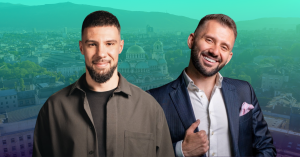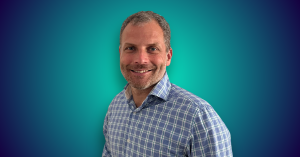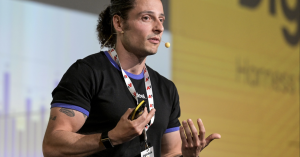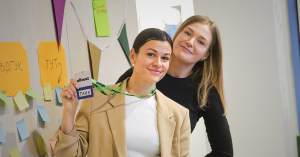“What retains me in my job is the team, the freedom to experiment and jump from one creative idea to another, and the opportunity to help others achieve their potential. It’s great that I can dig into different businesses and challenges and I love that I can meet with inspiring, bright, and ambitious people on a daily basis,” shares 24-years-old Roberta Tihomirova. She works as a Marketing and Communications Specialist at the regional VC Eleven Ventures.
Gen Z talents (born after 1995 and 1996) are making their first steps into the labor market and are about to become an integral part of the modern workforce. Being described as self-aware, persistent, realist, innovative and self-reliant, this generation is expected to soon surpass Millennials as the most populous generation, almost a third of the earth’s population.
Companies will need to rethink how they attract and retain employees to win in the Gen Z talent market. Diana Gindeva, Senior Recruiter Emerging Talent at VMware, and Roberta Tihomirova, Marketing and Communications Specialist at Eleven Ventures, shed light on the question of which factors appear to be the biggest motivator for Gen Z in the workforce? Find out in the interview what modern organizations need to attract next-generation talent.
- To retain their young employees, corporations need to adopt a startup-like work culture, allowing Gen Z talent to openly bring up ideas and build things from scratch.
- If companies can’t promise their Gen Z employees a quick climb on the career ladder, they can offer them learning opportunities or opportunities for horizontal growth.
- Gen Z is attracted by the opportunity to make something meaningful and challenging.
- Gen Z candidates have set expectations and are willing to openly share them with the interviewers.
Personal development and supportive culture matters
“I wouldn’t say that I had an edge when I entered the job market. What I had was confidence that I will find what I am looking for, the right fit for me, and also confidence that I am ready for this whole journey. I am not a big fan of the corporate culture and I never imagined myself in the typical 9 to 5 job,” Tihomirova recalls.
The main things that she was looking for in a job were flexibility and freedom to work both from home and the office, the opportunity to learn every day, and challenge herself to develop both as a professional and as a person. She was also seeking a position in a close-knit and supportive team and a company with a flat structure that would allow her to openly share her opinion and be heard. These motivators haven’t changed now.
Diana Gindeva from VMware explains that we live in times when working in a startup, or being a founder is kind of glorified, which makes it very attractive to younger generations. To some extent, this comes from the culture and the work dynamic that is innate for startups. The implications for big companies? Gindeva advises that to retain their young employees, corporations such as VMware need to adopt a startup-like work culture, allowing Gen Z talent to openly bring up ideas and build things from scratch.
“For example, in VMware, we have the Radio Conference, our internal incubator for ideas that allows employees who have ideas for software products, to gather a team, develop their products, and pitch them at the Radio Conference. The ideas that get the approval of the jury, usually receive funding and this is how many of the strong projects VMware have started. It is our way to stimulate internal proactiveness and innovation,” Gindeva shares.
Another such innovation-first initiative of VMware is their Internship Program. At a specific time of the year, in each team there is a brainstorming session about what can be done differently, outside of the product life cycle, to innovate and improve their products. The best ideas receive financing for an internship position. The intern is given full ownership of the project and the freedom to innovate instead of working on a set of specific tasks.
Another tendency that Gindeva brings up is that the younger generation is highly focused on career growth and expects this growth to happen faster than the older generations. “In some positions, there is no way to skip stages. Therefore, if companies can’t promise them a quick climbing the career ladder, can offer them learning opportunities or opportunities for horizontal growth. For example, in software companies, a person who specializes in the back-end can be given a chance to develop his front-end skills and become a full-stack professional. This would bring the desired need for personal accomplishment and career growth,” she elaborates.
Embrace their ambitiousness and move fast
Gindeva shares her observations that there is a big difference in the motivators and workplace behaviors between Millennials born in Bulgaria and those from the US as this generation has grown up in very different socioeconomic environments. In contrast, these differences among Generation Z have become less tangible.
“These young talents are more tech-savvy and can learn new programming languages faster, which makes them very flexible when it comes to working on various projects. Unlike my generation, Millennials, who prefer face-to-face communication in the workplace, Gen Z employees often prefer instant communication over chat. The digital type of communication and the preference for everything to happen faster and automatically is characteristic of them,” Gindeva highlights.
In addition, she shares her observations that Gen Z is attracted by the opportunity to make something meaningful. Unlike a couple of years ago when the candidates were seeking simply to find an internship or a job in VMware no matter what they would do, what drives them now is the essence of the work they will be doing. In other words, they care whether the job is meaningful, innovative, and progressive and whether they grow in the role.
Gindeva also points out the tendency of Gen Z employees to seek the best opportunity in terms of salaries. When she does interviews with young candidates, it is common that they come prepared with market research about the salary range of the position in the job offer. They have set expectations and are willing to openly share them with the interviewers.
“Don’t settle for your second best. Keep looking, be persistent, and don’t be discouraged to hear “No”. There are so many opportunities out there, be proactive, and patient, and you will find the right job for you. And also, moving back to my first answer – do not underestimate the power of networking,” shares Tihomirova as advice to Gen Z talents who are now making their first steps in the labor market.







